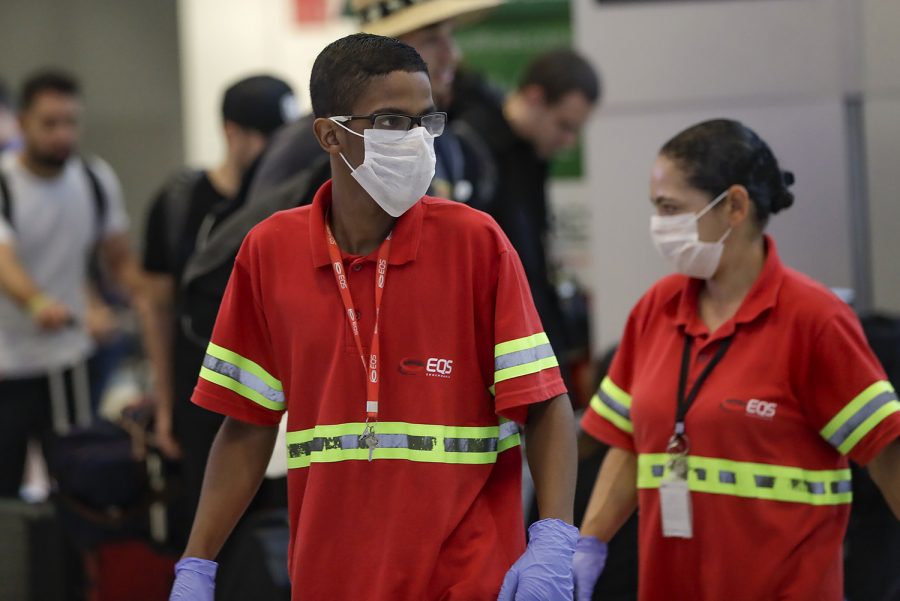Amid rising coronavirus fears, UI cancels programs in South Korea, takes on role in testing
Even though no cases of the 2019 Novel Coronavirus have yet to be reported in Iowa, the university has canceled study abroad programs to countries heavily impacted by the virus.
Airport employees wear masks as a precaution against the spread of the new coronavirus COVID-19 as they work at the Sao Paulo International Airport in Sao Paulo, Brazil, Wednesday, Feb. 26, 2020.
February 28, 2020
Although no cases of coronavirus have been reported in Iowa so far, the University of Iowa has issued further restrictions to study-abroad programs to countries impacted by the virus and is preparing for an expanded role in combatting the virus.
According to a UI statement issued Feb. 28, spring 2020 programs to South Korea have been suspended. This is paired with previous cancellations to spring and summer 2020 sessions in China. The reason for this, the release said, is because of both countries’ Warning Level 3 status, meaning nonessential travel to the regions is discouraged.
“The UI will continue to monitor reports and recommendations from national and regional health agencies, and is taking proactive actions to protect and support its faculty, staff, and students,” the statement said.
The Iowa Department of Public Health said Feb. 26 it is monitoring 12 Iowans for symptoms of the virus. At a news conference earlier this month, Gov. Kim Reynolds said the state’s risk is low, but added that her administration is working with health officials at the local, state, and federal levels to manage any cases that arise.
The UI’s State Hygenics Laboratory is now able to perform testing for the coronavirus, according to a release Feb. 27. The lab would use materials provided by the Centers for Disease Control and Prevention, if it’s requested to do testing by the Iowa Department of Public Health.
As The Daily Iowan previously reported, International Programs Dean Russell Ganim said the university worked closely with other Big Ten schools when deciding to cancel programs, which include the Institute for the International Education of Students, Council on International Educational Exchange, and United Study Abroad Consortium.
The Office of International Programs is involved with a number of professional societies that mandate travel restrictions, such as the Iowa Department of Public Health, NAFSA: Association of International Educators, and the U.S. State Department.
“Our health-care system is fully prepared to diagnose any potential person infected with the [corona]virus that may arise,” Vice President for Medical Affairs Brooks Jackson said at a state Board of Regents meeting on Feb. 5. “Back in 2014, we were really prepared for the Ebola virus. [Similarly,] most facilities and procedures are in place in case we need to do something similar for a patient with this virus.”
Concerns about controlling the possible spread of the coronavirus have risen among U.S. government officials as well. Flanked by Vice President Mike Pence and Health and Human Services Secretary Alex Azar on Wednesday evening, President Trump said the country is “totally prepared” for the possibility of the disease spreading across the U.S.
The CDC has urged people in the U.S. to prepare for more aggressive prevention measures to mitigate any possible spread of coronavirus.
Although Democrats and some Republicans say the $2.5 billion that Congress earmarked to fight the outbreak is not enough, Trump said his administration is willing to spend “whatever’s appropriate” to fight the disease.
The message reiterated that those who have traveled to or been in contact with people who have traveled to Wuhan, China within the last 14 days and feel sick with a fever, cough, or breathing difficulties to call the Student Health Nurseline (319-335-9704).



